Did Jesus physically rise from the dead? Does it matter?
We filmed this last year, but the message is still relevant.
Rev. Deacon Anthony Dragani, PhD talks about this very important pillar of Christianity.
Did Jesus physically rise from the dead? Does it matter?
We filmed this last year, but the message is still relevant.
Rev. Deacon Anthony Dragani, PhD talks about this very important pillar of Christianity.
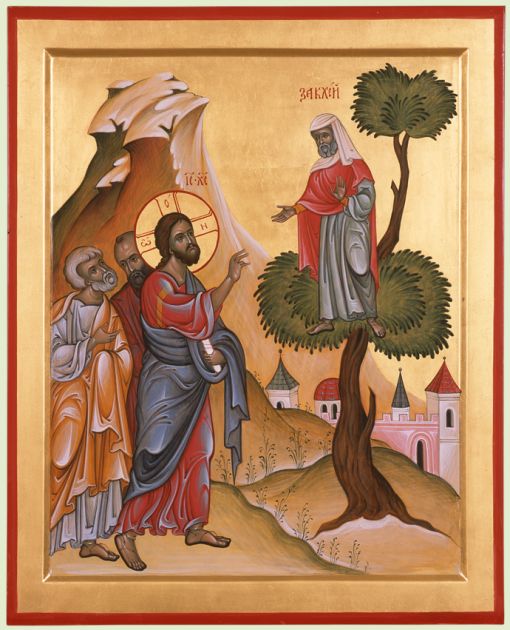 Today is Zacchaeus Sunday! (Lk 19:1-10)
Today is Zacchaeus Sunday! (Lk 19:1-10)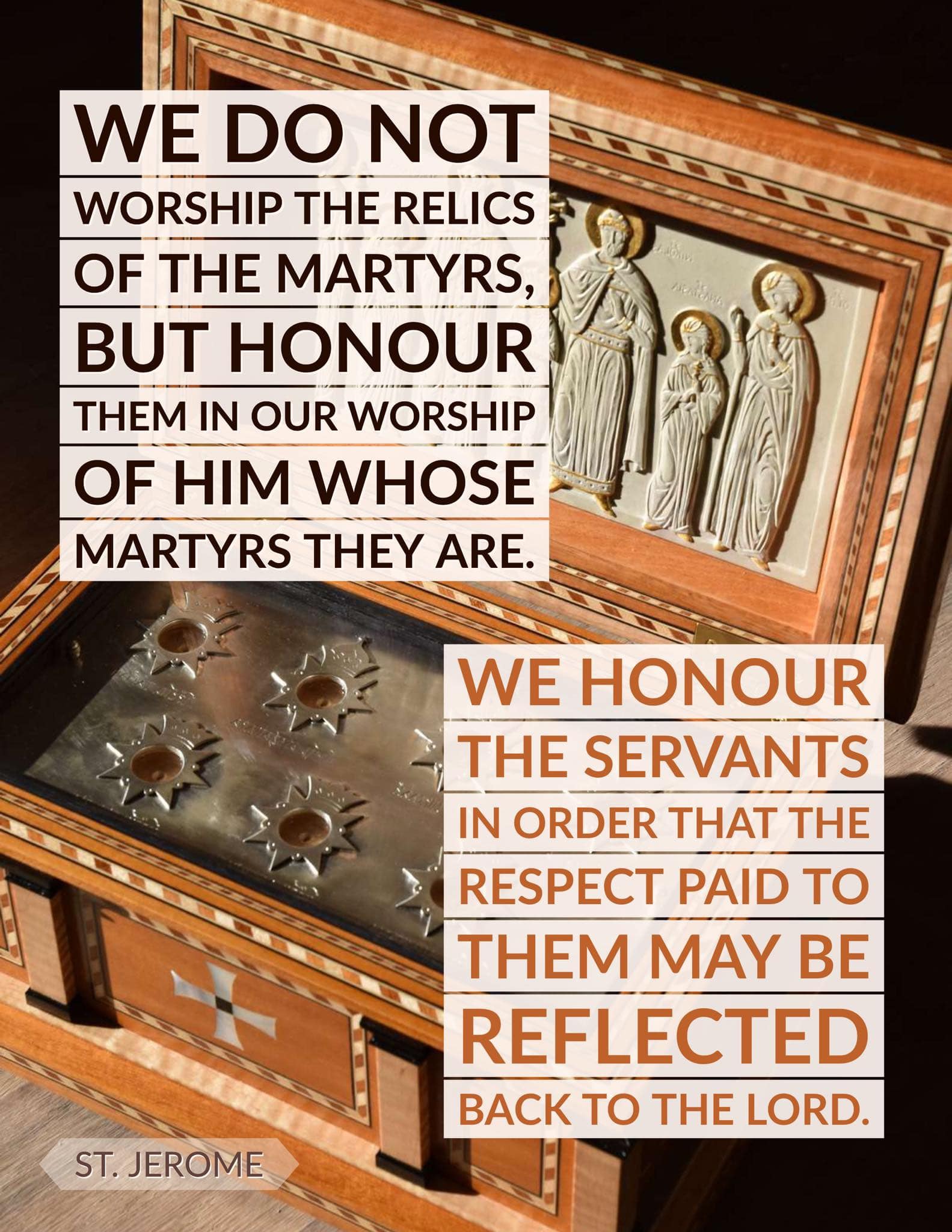 There seems to be significant questions surfacing among Catholics as to what the worship of God entails. It is a rather deep and intricate answer but two paragraphs may begin to reflect upon what the Church gives witness to and what is reasonable. What does the Church teach regarding worship, relics and honor of the saints?
There seems to be significant questions surfacing among Catholics as to what the worship of God entails. It is a rather deep and intricate answer but two paragraphs may begin to reflect upon what the Church gives witness to and what is reasonable. What does the Church teach regarding worship, relics and honor of the saints?
In the Catechism we read:
The Church also professes the Paschal mystery in the feasts of her saints, who suffered with Christ and with him were glorified. The Church offers the example of the lives of the saints to the faithful for imitation, in order to bring all to the Father through Christ in the Holy Spirit. The liturgical commemoration of saints is effected in the services and in the veneration of their icons and their relics. The date of the veneration of saints is usually the day of their death, that is, their birth to heaven. It can also be the day of the finding or transferral of their relics. Every day of the Church Year is dedicated to one or more particular saints. The liturgical services (hymnography) for the saints are collected month by month in twelve volumes called the Menaia (from the Greek, meaning monthly).
AND
One of the first Fathers who elaborated a theological foundation for icon veneration was Saint John of Damascus. He teaches: “I venerate the icon of Christ the incarnate God … because the honour that we render unto the image belongs to the Prototype.” In the icon, we venerate not the image but the imaged person, whom we prayerfully contemplate. This is because the icon raises our mind from the image to the Prototype. The Seventh Ecumenical Council of 787 condemned Iconoclasm and confirmed the veneration of icons of the Lord Jesus Christ, the most holy Mother of God, and the angels and saints. Along with this, the Council distinguished between adoration, which is due exclusively to God (in Greek, latreia), and veneration (in Greek, proskynesis), which we render unto icons, the Gospel Book, the cross, and the relics of saints. We venerate icons by kissing and censing them, and lighting candles and lamps before them. The icon is also the Church’s teaching expressed in images. Therefore it should be written not arbitrarily but only accord ing to iconographic canons which ensure that the faces of Christ, the Mother of God, and of the saints are recognizable in all instances.
In this episode the EWTN Theology Roundtable crew answer questions about the Holy Mysteries of the Eastern Churches, as the Sacraments are called in Eastern Catholicism. Colin Donovan and Robert Klesko do a terrific job.
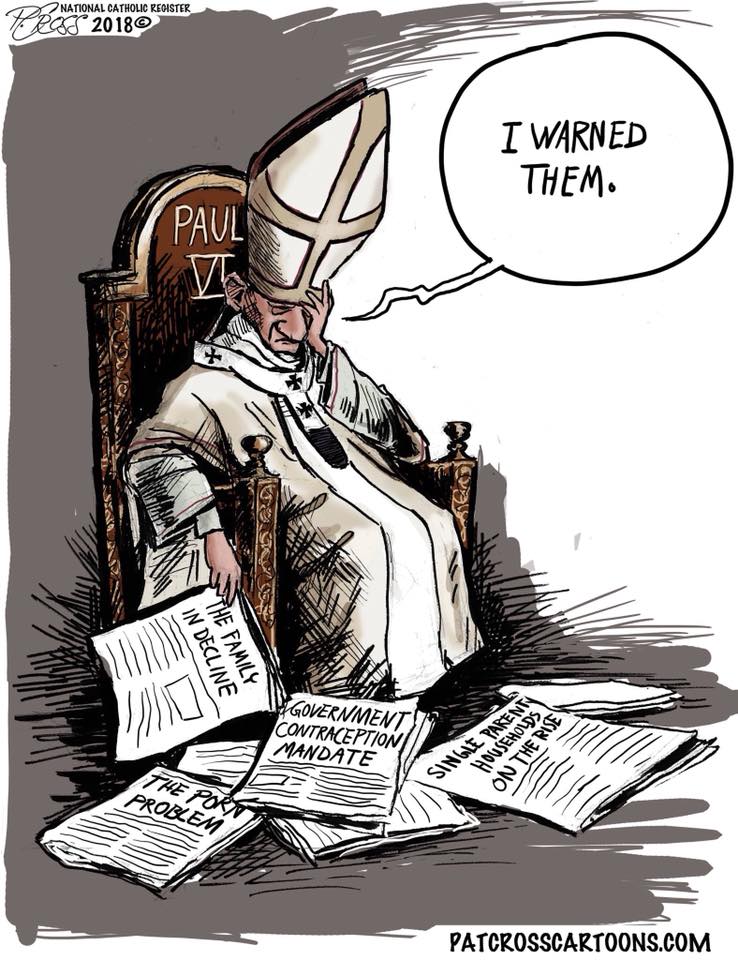
Today is the 51st anniversary of Pope Saint Paul VI’s landmark encyclical, Humanae vitae .
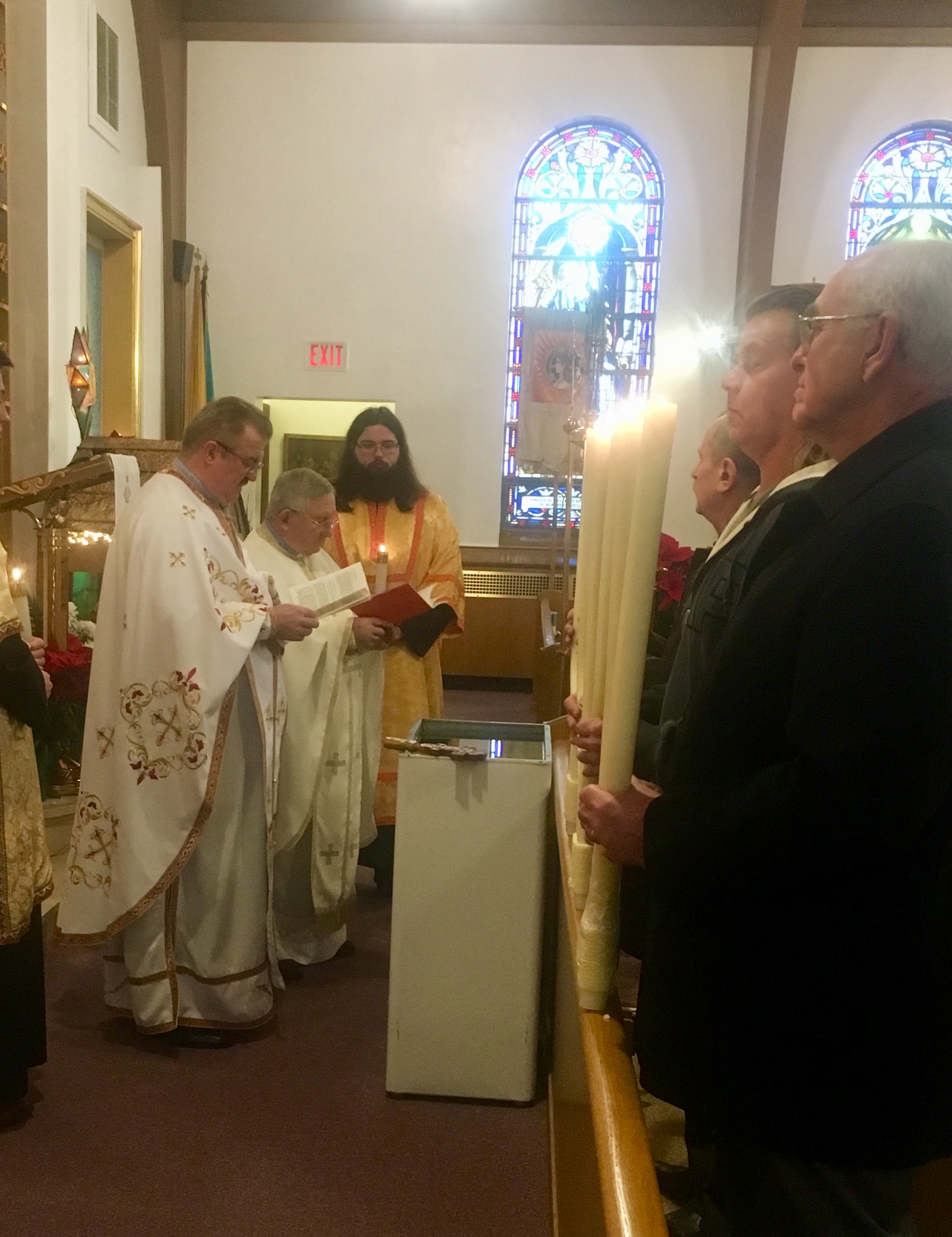 Father Iura prayed the prayers for the Great Blessing of Water on Theophany (Jan. 6, 2019) with Father Stepan concelebrating.
Father Iura prayed the prayers for the Great Blessing of Water on Theophany (Jan. 6, 2019) with Father Stepan concelebrating.
“The voice of the Lord upon the waters cries aloud saying, “Come you all, and receive the Spirit of wisdom, the Spirit of understanding, the Spirit of the fear of God, from Christ who is made manifest. Today the nature of the waters is sanctified, and the stream of its own waters, seeing the Master being baptized.”
The Holy Theophany is yet another feast of the Nativity and the beginning of the ministry of the Lord with his baptism in the Jordan.
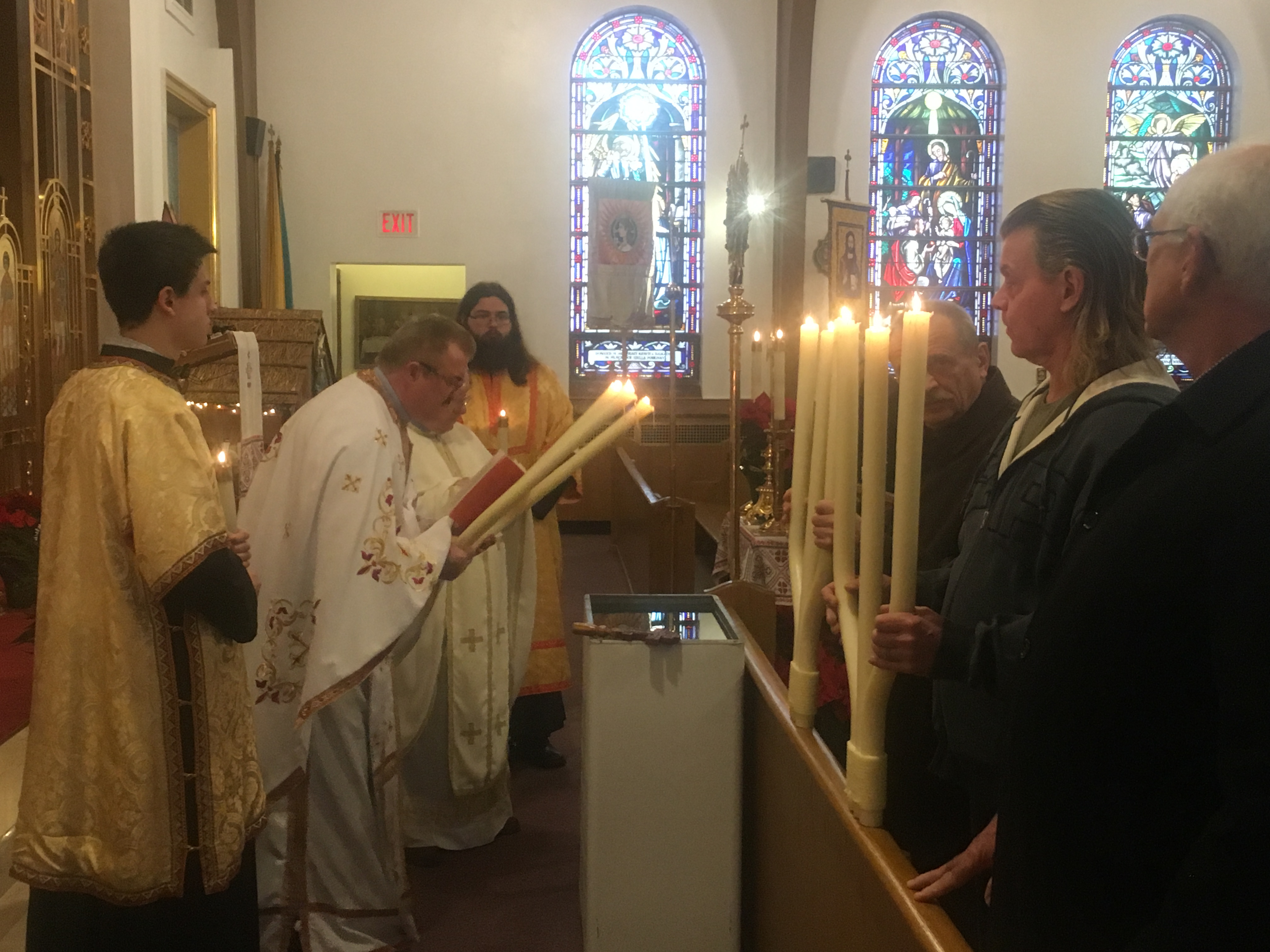 Striking is the theology used in the prayers that through the waters we are given the grace of redemption, … that Satan be swiftly crushed beneath our feet and that every counsel that is directed against us by the Evil One may be made of no effect, … that we may be enlightened by the light of knowledge and godliness through the descent of the Holy Spirit, … that the blessed water be an instrument of a remission of sins, for the healing of soul and body and for every purpose that is expedient… and be a fountain springing us into eternal life.
Striking is the theology used in the prayers that through the waters we are given the grace of redemption, … that Satan be swiftly crushed beneath our feet and that every counsel that is directed against us by the Evil One may be made of no effect, … that we may be enlightened by the light of knowledge and godliness through the descent of the Holy Spirit, … that the blessed water be an instrument of a remission of sins, for the healing of soul and body and for every purpose that is expedient… and be a fountain springing us into eternal life.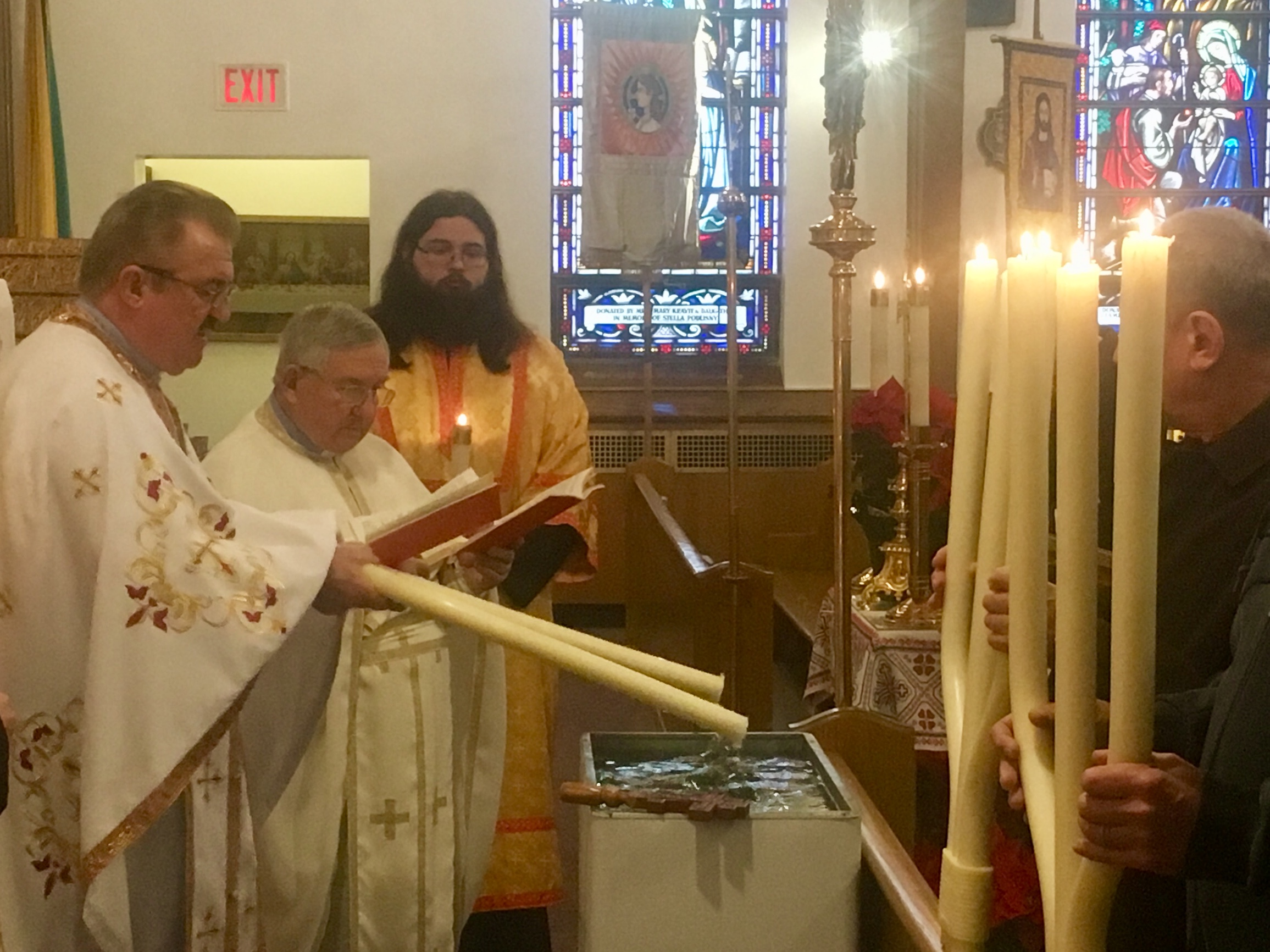
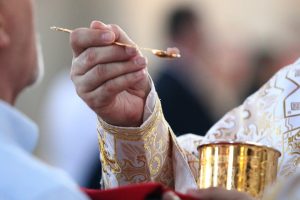
Receive the Body of Christ, Taste the Fountain of Immortality. Alleluia!
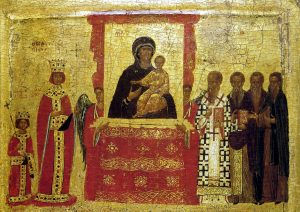 On this Sunday, we also remember the Nicea II Council in 787, which defined that we can make images (icons) of our Lord and the saints, and venerate them. This council was held in the midst of the iconoclastic (the “image breaking”) controversy, the first phase from 726-787, and the second phase from 814-842. It draws attention to how important images are for us. I know of few homes that do not have a picture, today usually a photograph but sometimes a portrait or drawing, of those we love.
On this Sunday, we also remember the Nicea II Council in 787, which defined that we can make images (icons) of our Lord and the saints, and venerate them. This council was held in the midst of the iconoclastic (the “image breaking”) controversy, the first phase from 726-787, and the second phase from 814-842. It draws attention to how important images are for us. I know of few homes that do not have a picture, today usually a photograph but sometimes a portrait or drawing, of those we love.
If we love Christ first with our whole heart and mind and soul, the image helps us to focus that love. We know these images are only paper or wood and ink or paint, but through the eyes of our body they make the person present in spirit. Yet some people hate images. There is a danger of idolatry, and the council did dialogue with those people who had that fear of idol-worship, and so defined clearly how images are to be venerated: “For the more they are contemplated, the more they move to fervent memory of their prototypes. Therefore, it is proper to accord to them a fervent and reverent adoration, not, however, the veritable worship which, according to our faith, belongs to the Divine Being alone — for the honor accorded to the image passes over to its prototype, and whoever adores the image adores in it the reality of what is there represented.” This is the Christian faith. We cannot make images of the divine nature, but the mystery of the incarnation, in which the Word of God became truly a human being, the two natures united in one person, allows us to make images of Jesus, who was like us in every way except sin. This leads us to a deeper mystery, that we are created in the image of God, and that “all of us, gazing with unveiled face on the glory of the Lord, are being transformed from glory to glory, as from the Lord who is the Spirit. (2 Corinthians 3:18)” And the glory and the wisdom of the Lord is his emptying, his love, his cross and his resurrection.
Meditation by Archpriest David Petras
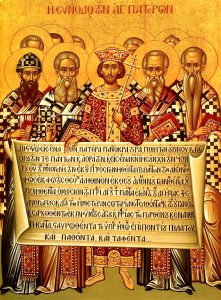 On this Sunday, we commemorate the First Ecumenical Council held in the year 325. This Council defined our faith in Christ, that he was truly God, who had been born of the Virgin Mary as a human being, therefore uniting God and us. The proclamation of faith that they composed is now read at every Divine Liturgy. It was completed in its present form at the Council of Constantinople in 381, with a fuller definition of the nature of the Holy Spirit. When the Creed is about to be read, the deacon intones, “Let us love one another, that with one mind we may profess: (we then recite the Creed).” In our faith, we profess the love of God for us, because he has come to be with us, and has sent the Spirit of truth in our hearts, to “ … guide you to all truth. (John 16:13)” The truth is this: that Jesus the Messiah is truly the Son of God, that he is our Redeemer, and that he has ascended into glory, but has not left us orphans, sending his Spirit into our hearts and minds and souls. Jesus told us, “I am the way and the truth and the life. (John 14:6)” If this is indeed the truth, then, as the deacon in the Liturgy says, we must profess it “in one mind.” We conclude the prayer of the Anaphora by saying, “Grant that with one voice and one heart we may glorify and praise your most honored and magnificent name, Father, Son and Holy Spirit.”
On this Sunday, we commemorate the First Ecumenical Council held in the year 325. This Council defined our faith in Christ, that he was truly God, who had been born of the Virgin Mary as a human being, therefore uniting God and us. The proclamation of faith that they composed is now read at every Divine Liturgy. It was completed in its present form at the Council of Constantinople in 381, with a fuller definition of the nature of the Holy Spirit. When the Creed is about to be read, the deacon intones, “Let us love one another, that with one mind we may profess: (we then recite the Creed).” In our faith, we profess the love of God for us, because he has come to be with us, and has sent the Spirit of truth in our hearts, to “ … guide you to all truth. (John 16:13)” The truth is this: that Jesus the Messiah is truly the Son of God, that he is our Redeemer, and that he has ascended into glory, but has not left us orphans, sending his Spirit into our hearts and minds and souls. Jesus told us, “I am the way and the truth and the life. (John 14:6)” If this is indeed the truth, then, as the deacon in the Liturgy says, we must profess it “in one mind.” We conclude the prayer of the Anaphora by saying, “Grant that with one voice and one heart we may glorify and praise your most honored and magnificent name, Father, Son and Holy Spirit.”
Today’s Gospel tells us that this is exactly how we are united to God, and become “partakers of the divine nature (2 Peter 1:4): “Holy Father, keep them in your name that you have given me, so that they may be one just as we are. (John 17:11)” There is no unity more perfect than the unity of the Trinity, and in our life of faith, we share in that unity. Throughout the history of the Church, there have been those who have erred either by saying that Jesus is not perfect man or by saying that he is not perfect God. We too often let our own self-righteousness dominate the transcendent truth of the faith. However, the deacon says one thing even more profound – this unity must proceed from love, for he says, “Let us love one another that we may profess … “ The world today seems to thrive on a rhetoric of hate rather than love, and the false ideas of the world can easily infect the Church. The feast today is directly opposed to hatred, it tells us that we can achieve the unity that God desires only through love, for “God is love. (1 John 4:8)”
https://vimeo.com/198607547
The video from the Eastern Catholic Bible Conference in November 2016.
More information can be found here: http://wordoflifeinstitute.com
The next conference will be in Phoenix, Arizona, May 19, 20, 2017. The theme for the conference is: “The Book of Beginnings: Reading Genesis in the Eastern Christian Tradition.”